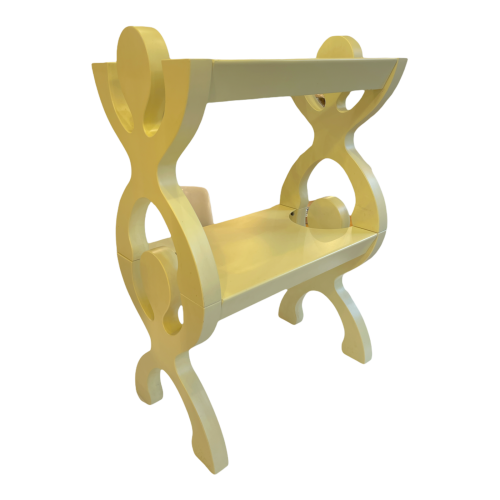- Artist / Designer:Actually unknown
- Issuer / Manufacturer:Actually unknown
- Period:20th Century / Mid Century / 1980s
- Country of Origin:Probably Italy
- Dimensions (H x W x D):45 x 57 x 34 cm
- Weight:10 Kg
- Number of components:2
- Condition:Excellent
- Style:Memphis / Radical Design
- Materials:Lacquered Metal / Lacquered Wood
-
Price:On request
- Belgium Delivery:On request
- International Delivery:On request
Amazing pair of small multifunctional tables dating from the 1980s.
Memphis style (Ettore Sottsass) or Radical Design (Alessandro Mendini), the designer is currently unknown but probably Italian, the characters reminding the artist Keith Haring...
Anthropomorphic structures in celadon lacquered wood, metal seats, brass elements.
Very resistant assembly that can be used as stools, shelves, side tables, sofa ends, bedside tables (night tables).
Very good condition, some scratches, see pictures
Other pair available ( see pictures )
The Memphis group was founded in Milan by Ettore Sottsass in 1980. It appeared in a new direction of Italian design, opening up to the fashion and international artistic movements of the time such as Pop Art. It destabilized the codes of post-Bauhaus design by introducing a much wider range of colours, pattern, the use of laminate in furniture and more generally, new forms in furniture, lighting or table elements.
Its members included Michele De Lucchi, Matteo Thun, Marco Zanini, Aldo Cibic, Andrea Branzi, Shiro Kuramata, Michael Graves, Peter Shire, Javier Mariscal, Barbara Radice, Martine Bedin, George J. Sowden, Masanori Umeda and Nathalie du Pasquier.
The emergence of plastic laminate paved the way for a series of reflections and revisions on the subject of materials, their quality, possible combinations and their cultural charge. As a result, materials began to be read, chosen and used as active protagonists, privileged vehicles of sensory communication, each telling their own story. In addition to plain or printed laminated plastics, Memphis' production included many other industrial materials: printed glass, foil-metals, celluloid, zinc-plated and textured steel finishes, industrial paints, neon tubes, coloured light bulbs...
The group disbanded in 1988.
